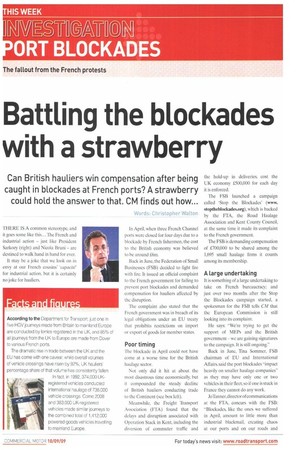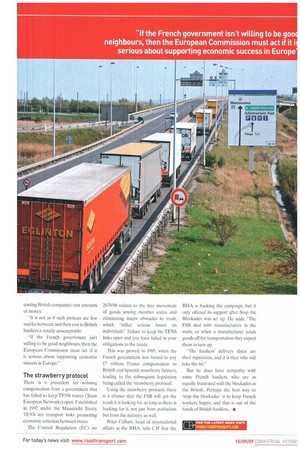attling the blockades with a strawberry
Page 20

Page 21

If you've noticed an error in this article please click here to report it so we can fix it.
Can British hauliers win compensation after being caught in blockades at French ports? A strawberry could hold the answer to that. CM finds out how...
Words: Christopher Walton
THERE IS A common stereotl,pe, and it goes some like this... The French and industrial action — just Like President Sarkozy (right) and Nicola Bruni — are destined to walk hand in hand for ever.
It may be a joke that we look on in envy at our French cousins' capacite' for industrial action, but it is certainly no joke for hauliers.
According to the Department for Transport, just one in five HGV journeys made from Britain to mainland Europe are conducted by lorries reglstered in the UK, and 85% of all journeys from the UK to Europe are made from Dover to various French ports.
The dramatic rise in trade between the UK and the EU has come with one caveat: while overall volumes of vehicle crossings have risen by 92%, UK hauliers' percentage share of that volume has conslstently fallen In fact, in 1992, 374,000 UKregistered vehicles conducted international haulage of 738,000 vehicle crossings Come 2008 and 383,000 UK-registered vehicles made similar journeys to the combined total of 1,412,000 powered goods vehicles travelling to mainland Europe. In April, when three French Channel ports were closed for four days due to a blockade by French fishermen, the cost to the British economy was believed to be around .16m.
Back in June, the Federation of Small Businesses (FSB) decided to tight fire with fire. It issued an official complaint to the French government for failing to prevent port blockades and demanded compensation for hauliers affected by the disruption.
The complaint also stated that the French government was in breach of its legal obligations under an EU treaty that prohibits restrictions on import or export of goods for member states.
Poor timing
The blockade in April could not have come at a worse time for the British haulage sector.
Not only did it hit at about the most disastrous time economically, but it compounded the steady decline of British hauliers conducting trade to the Continent (see box left).
Meanwhile, the Freight Transport Association (FTA) found that the delays and disruption associated with Operation Stack in Kent, including the diversion of commuter traffic and the hold-up in deliveries, cost the UK economy 1500,000 for each day it is enforced.
The FSB launched a campaign called 'Stop the Blockades' (www. stoptheblockades.org), which is backed by the FTA, the Road Haulage Association and Kent County Council, at the same time it made its complaint to the French government.
The FSB is demanding compensation of /700,000 to be shared among the 1,695 small haulage firms it counts among its membership.
A large undertaking
It is something of a large undertaking to take on French bureaucracy; and just over two months after the Stop the Blockades campaign started, a spokesman for the FSB tells CM that the European Commission is still looking into its complaint.
He says: "We're trying to get the support of MFPs and the British government — we are gaining signatures to the campaign. It is still ongoing."
Back in June, Tina Sommer, FSB chairman of EU and International Affairs, said the port blockades "impact heavily on smaller haulage companies" as they may have only one or two vehicles in their fleet, so if one is stuck in France they cannot do any work.
JoTanner, di rector of communications at the ETA, concurs with the FSB: "Blockades, like the ones we suffered in April, amount to little more than industrial blackmail, creating chaos at our ports and on our roads and costing British companies vast amounts of money.
"It is not as if such protests are few and far between, and their cost to British hauliers is totally unacceptable.
"If the French government isn't willing to be good neighbours, then the European Commission must act if it is serious about supporting economic success in Europe."
The strawberry protocol
There is a precedent for winning compensation from a government that has failed to keep TENS routes (Trans European Networks) open. Established in 1992 under the Maastricht Treaty, TENS are transport links promoting economic cohesion between states.
The Council Regulation (EC) no 2679/98 relates to the free movement of goods among member states and eliminating major obstacles to trade, which "inflict serious losses on individuals'? Failure to keep the TENS links open and you have failed in your obligations to the treaty.
This was proved in 1995, when the French government was forced to pay 17 million Francs compensation to British and Spanish strawberry farmers, leading to the subsequent legislation being called the 'strawberry protocol: Using the strawberry protocol, there is a chance that the FSB will get the result it is looking for, as long as there is backing for it, not just from politicians but from the industry as well.
Peter Cullum, head of international affairs at the RHA, tells CM that the RHA is backing the campaign, but it only offered its support after Stop the Blockades was set up. He adds: "The FSB deal with manufacturers in the main, so when a manufacturer sends goods off for transportation they expect them to turn up.
"The hauliers' delivery dates are their reputation, and it is they who will take the hit.
But he does have sympathy with some French hauliers, who are as equally frustrated with the blockades. as the British. Perhaps the best way to 'stop the blockades' is to keep French workers happy; and that is out of the hands of British hauliers... •




















































































































































